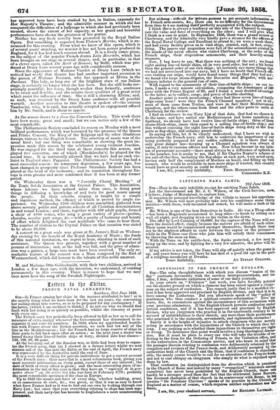CONFESSION IN THE CHURCH OF ENGLAND.
San—The calm thoughtfulness with which you discuss "topics of the day" contrasts favourably with the careless misrepresentations, and too often, I fear, deliberate unfairness of some of our daily journals.
In your article on "Evidence" last week, you have forcibly pointed out the slender ground on which a clamour has been raised against a clergy- man on the subject of confession. You remark justly that to a modified ex- tent it has been approved and practised by English divines, and that it is in force among the Lutherans. But you afterwards speak of the "policy of gentlemen who thus conduct a spiritual counter-reformation." Give me leave, Sir, to remonstrate against the inconsistency of this accusation with your previous admissions. If the English Church permits confession under certain conditions, and if it has been approved and practised by English divines, why are clergymen who practise it in the nineteenth century to be accused of unfaithfulness to their church, any more than their predecessors who practised it in the sixteenth, seventeenth, and eighteenth centuries? Surely it is the height of injustice to attack clergymen who are merely acting in accordance with the injunctions of the Church to which they be- long. I say nothing as to whether these injunctions in themselves are right or wrong. To determine that point would involve a long theological discus- sion. But it must be plain to every one who will take the trouble of re- ferring to the form for the Ordering of Priests, to the Visitation office, and to the exhortation in the Communion service, and who bears in mind that the passages therein relating to confession were deliberately retained by the compilers and revisers of the Prayer-book, and deliberately accepted by the authorities both of the Church and the State, that if confession is objection' able, the manly course would be to call for an alteration of the Prayer-book, and not to cast obloquy on clergymen who simply do what is enjoined upon them by law. That confession (as distinguished from the direction which is practised in the Church of Rome and indeed by many "evangelical" ministers among ourselves) has never been prohibited by the English Church, there can hardly be a stronger proof than the fact that the celebrated Isaac Barrow, the foremost champion of that church in its controversy with Rome, in his treatise "De Potestate Clavium " speaks of its practice in the Church of England as a matter of course, which requires neither explanation nor de- fence,


























 Previous page
Previous page